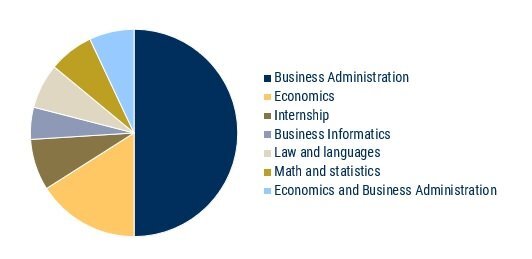Programme content
Can a company increase its sales by making good decisions? Of course! But this is not only achieved by the big boss or the head of the firm, but above all through the interaction of a wide range of areas. After all, goods have to be procured, properly stored, sold and ultimately transported to the customer. All these processes are recorded and added to a company’s balance sheets – so it clearly needs enough staff.
And this is the very essence of Business Administration. This field of study will give you a comprehensive package of specialist knowledge in a wide range of areas, such as marketing, management, accounting, controlling and logistics. Your studies will also present business formulas and KPIs that will help you illustrate complex relationships in an understandable manner. This degree programme will equip you with a set of skills that will come in handy in a variety of industries, helping you make a quick and confident start to your career. Do you only want to specialize in one area? No problem! You can do this by choosing a specific focus as you progress in your studies.
Digital discovery tour with free app: Would you like to solve some fun puzzles and learn more about studying at the Faculty of Economics and Business Administration? Click here for our interactive discovery tour app.
Structure
Our bachelor’s programme is the first degree qualifying graduates to work in their profession. The standard length of the study programme is six semesters, and different types of courses are offered for each module (e.g. seminars, lectures or exercises).
In this single-subject Bachelor’s programme, the focus is on one subject comprising 180 credits (ECTS for short; 1 ECTS = 30 hours for attendance, preparation and follow-up work, private study, assessed coursework and examinations).
You can choose from eight focus areas within the Faculty of Economics and Business Administration at Friedrich Schiller University Jena. If you choose ‘Business Administration’ as your focus, you will look at various operational functions within companies, such as marketing, production and controlling, and consider the relationships between these areas. The focus is structured as follows:
Overview of the study profile
Picture: Sophie BartholomeYou can complete the internship either before the start of your studies, during one of your mid-term breaks or during a semester (by applying for a semester on leave).
Our university also offers the following focus areas: Standard Focus, Economics, Business Information Systems, Information and Management Sciences, Business Analytics, Business and Economics Education Studies I and Business and Economics Education Studies II. You can change your focus during your studies.
By the way: There is a mathematics bridging course to help you prepare for your studies. We strongly advise all students to attend.
How might your degree programme shape up?
| 1st semester | 2nd semester | 3rd semester | 4th semester | 5th semester | 6th semester |
| Accounting (3 ECTS) |
Statistics (6 ECTS) |
Foundations of Marketing Management (6 ECTS) |
Investment, Financing and the Capital Market (6 ECTS) |
Integrated Information Processing (4 ECTS) | Choice of specialization module* (6 ECTS) |
| Financial Accounting and Controlling (6 ECTS) |
Organization, Leadership and Human Resource Management (6 ECTS) |
Planning and Decision-Making (6 ECTS) |
Management (6 ECTS) |
Foreign Languages (6 ECTS) |
|
| Operations Management (6 ECTS) |
Taxation / Auditing (6 ECTS) | Foundations and Perspectives of Economic Studies (3 ECTS) |
Macroeconomics (5 ECTS) |
Choice of specialization module* (6 ECTS) |
Bachelor’s dissertation (10 ECTS) |
| Introduction to Economics (5 ECTS) |
Law A (4 ECTS) |
Law B (2 ECTS) |
Choice of specialization module* (6 ECTS) |
Choice of specialization module* (6 ECTS) |
|
| Microeconomics (5 ECTS) |
Introduction to Business Information Systems (6 ECTS) | Finance (5 ECTS) | Choice of specialization module* (6 ECTS) |
Choice of specialization module* (6 ECTS) |
|
| Mathematics A (3 ECTS) |
Mathematics B (3 ECTS) |
Empirical and Experimental Research in Economics (6 ECTS) |
Seminar for specialization module* (6 ECTS) |
||
| Vocational learning content (14 ECTS) | |||||
Abbreviations: ECTS = European Credit Transfer and Accumulation System (credit points)
* You have to take six elective specialization modules. To do this, you will have to choose one of the following focus areas: Finance, Accounting & Taxation; Decision and Risk; International Management; Strategy, Management and Marketing; Supply Chain Management; or Business Information Systems. You have to choose at least four modules from this area; the other two modules can be combined as you wish.
More detailed information can be found in the module catalogue for the study programmeExternal link.
Why study in Jena?
- High flexibility: Shape your studies according to your personal strengths and interests. You can always change direction during your studies by choosing a new focus or switching to a similar study programme.
- Research focus: The chairs of the Faculty of Economics and Business Administration de conduct research in various areas that are covered by the degree programme, such as ‘Finance, Accounting & Taxation’, ‘Corporate Governance: Management and Corporate Control’ and ‘Decision and Risk’.
- Close cooperation: Make the most of our extensive network of business contacts in Thuringia, e.g. by completing an internship during your studies.
- Adventures abroad: The University and the Faculty of Economics and Business Administration de promote and encourage intercultural exchange through a wide range of programmes and initiatives. The faculty has a global network of over 50 renowned partner universities, and more first-class institutes are added on a regular basis.
- Excellent supervision: As we want our new students to feel comfortable and find their feet right from the start, the Orientation Days at the Faculty of Economics and Business Administration de provide more information on the organization of studies, institutions and university services.
What can you do after your studies?
Areas of employment for graduates
Depending on your chosen area of specialization, you can look forward to a wide range of career opportunities in various fields of business and economics:
- in commerce (e.g. accounting, controlling, management, human resources, production, logistics, taxes)
- in all areas of the private sector with a high demand for analytical skills (e.g. consulting firms, banks, insurance companies)
- in the public sector (e.g. administration, statistical offices, authorities and ministries, associations, chambers)
- in the IT sector (e.g. as a business analyst)
- in science and research (e.g. as a teaching associate at a university, generally with a master’s degree)
- as a teacher of economics, business administration or law at vocational colleges
- in a newspaper’s editorial department for business and economics
Downloads and links for the degree programme
What are we looking for in prospective students?
- An interest in current affairs in business and economics
- Good knowledge of German (language of instruction: German) and a good grasp of mathematical concepts
- Good organization skills and time management
Admission requirements
-
University entrance qualification
A university entrance qualification, such as a general secondary school leaving certificate, is required for admission onto the study programme.
More information on university entrance qualifications can be found here.
-
Language requirements
Admission and language requirements for applicants of foreign nationality and without German Abitur: www.uni-jena.de/en/study-orientation-international
Contacts
Room 4.97
Carl-Zeiß-Straße 3
07743 Jena
Google Maps site planExternal link
Opening hours:
Monday - Friday 08:30a.m. - 11:30a.m.
Carl-Zeiß-Straße 3
07743 Jena
Google Maps site planExternal link
Opening hours:
Monday: closed
Tuesday: 08.30 to 11.30
Wednesday: 14.00 to 16.00
Thursday: 08.30 to 11.30
Friday: 08.30 to 11.30
Room 4.131
Carl-Zeiss-Str. 3
07743 Jena
Google Maps site planExternal link
Room 4.128
Carl-Zeiß-Straße 3
07743 Jena
Google Maps site planExternal link
University Main Building / SSZ
Fürstengraben 1
07743 Jena
Google Maps site planExternal link
Office hours:
The Central Student Advisory Service will be closed from 22 December 2025 to 2 January 2026. We will be happy to assist you again from 5 January 2026!
We offer consultations in person, by telephone, and via Zoom. You can make an appointment by calling us on +49 3641 9-411111 (Mondays to Fridays from 9:00 to 11:00) or outside these office hours on +49 3641 9-411200. You can also use our remote help desk.
Consultation hours:
Mondays, Tuesdays, Thursdays and Fridays (9:00 to 12:20), Tuesdays (14:00 to 18:00), and Wednesdays and Thursdays (14:00 to 16:00).
Video chat: To the video chat – Zoom Videochat ZeitenMondays to Fridays (12:30 to 13:00) Password ZSB2020 Data protection informationpdf, 101 kb
University Main Building, Room E065
Fürstengraben 1
07743 Jena
Google Maps site planExternal link
Opening hours:
Information Desk (UHG; Room E0.65)
Mondays (10:00 – 12:00)
Tuesdays (13:00 – 15:00)
Wednesdays (10:00 – 12:00)
Thursdays (13:00 – 15:00)
Fridays (10:00 – 12:00)
You can also use our remote help desk at
www.uni-jena.de/service-ssz
or send us your enquiries by post.
Telephone hours:
Mondays to Fridays
(9:00 – 11:00)
Postal address:
Friedrich-Schiller-Universität Jena
Studierenden-Service-Zentrum
07737 Jena
University Main Building
Fürstengraben 1
07743 Jena
Google Maps site planExternal link


